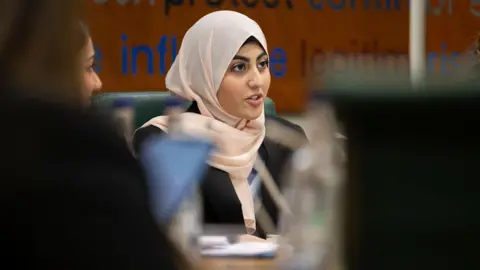Social media ban not practical or effective, teens say
 House of Commons
House of CommonsThe government needs to do more to protect young people from violent and harmful content online, a report by teenagers suggests.
The Youth Select Committee, a parliamentary group of 14 to 19-year-olds led by the National Youth Agency and supported by the House of Commons, said the Online Safety Act was not robust enough to protect children from being exposed to dangerous material.
But the committee argued against calls to ban social media for under-16s, like the one being implemented in Australia, saying it "is neither practical nor effective".
The government said it was "making our streets and online spaces safer for children" by delivering its Plan for Change.
Wania Eshaal Ahmad, the 15-year-old chair of the committee, said it was "quite abhorrent" that social media algorithms could inadvertently promote violent and harmful content to keep young people engaged.
She said some young people were becoming desensitised to glorified violence online, because of how often it is shown to them.
The committee called for better media literacy education in schools, including about how algorithms work and how students can "protect themselves and distinguish fact from fiction".
The report also called for more training and support for teachers, parents and carers to help educate young people on the potential dangers of the online world.
The report welcomed measures in the Online Safety Act, but said the act was not robust enough to enforce minimum age limits on social media platforms, or to ensure children and young people would be protected from harmful content.
The Act puts more responsibility on social media companies to prevent their services being used for illegal activity, and to take down illegal content when it does appear.
Those measures have already been introduced. A government spokesperson said those were "just the beginning", and more were due to come into effect this year.
But the committee's report said the government should do more, including naming and shaming platforms which fail to comply with the rules, introducing an online safety scorecard to help young people avoid harmful content, and doing more research into the links between online and real-life violence.
While the committee said the act does not go far enough, its report said banning social media for under-16s was not the answer.
Many young people could find ways around age verification methods, and a ban would stop them accessing positive content on social media, the report said.
The committee instead called on the government to hold social media companies to account more effectively.
Members also said young people should be consulted more often in discussions around staying safe online, saying their experience and ideas for solutions were "vital to shaping real change".
"Responsibility is a very key aspect of our report," Wania said.
"And that's what we need from the government, from social media companies and from the education system.
"We don't need empty promises. We need them to take action, and action is the only way forward."
The Youth Select Committee is an initiative led by the National Youth Agency and supported by the House of Commons.
Additional reporting by Vanessa Clarke.
